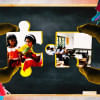Rethinking university education
The recent remark by a visiting British scholar that universities should focus more on developing leadership, adaptability and communication skills opens up an opportunity to address the role universities should play in Bangladesh. The model of higher education in the 20th century that had an emphasis on technological innovation needs to be reevaluated in order to face the challenges of the twenty first century, he said.
The realities of Bangladesh are, however, different from those of the developed countries that are well-equipped with technologies necessary to enhance the quality of life for their citizens. Bangladesh started her journey only four decades ago and badly needs highly trained scientists, engineers, doctors, IT experts and other professionals to meet the country's development challenges. To this end, universities should commission research that will bring customised solutions to various problems in different sectors. They should receive adequate funding and training to build the capacity to undertake such projects.
Higher education is about expanding the mind through seeking greater knowledge. But universities should also be the seats of learning where students receive a better understanding of the sciences and the arts and the humanities necessary for individual and national development. Thus, higher education has a two-fold function to perform. One is to develop skills and the other is to nurture human qualities for creating a peaceful and harmonious society.
Universities of the country, throughout history, have fulfilled that purpose. Given the challenges we face today, it is imperative that they give more importance to both.

 For all latest news, follow The Daily Star's Google News channel.
For all latest news, follow The Daily Star's Google News channel. 








Comments